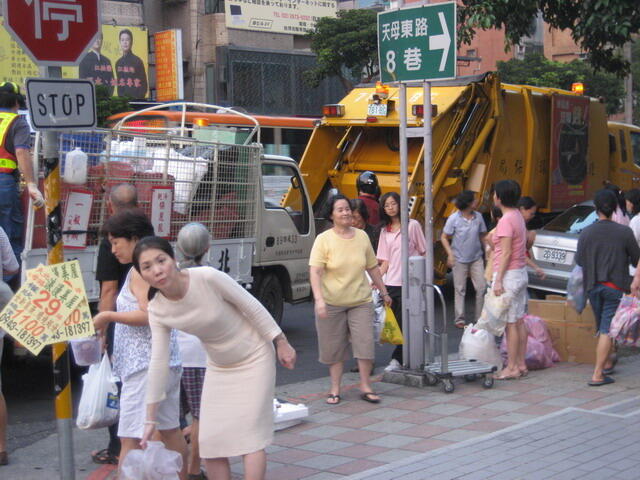Prepared by – Suzanne Abou Said Daou In Lebanon and before the waste crisis, discussing the topic of garbage sorting, wouldn’t have drawn attention from our fellow citizens; but now, with this crisis; every intention or initiative to deal or even mitigate the quantities of waste, is treated with complete consideration and seriousness. In Taiwan and until a few years ago, the darker side of the Taiwanese industrial boom has revealed itself as accumulated wastes in the streets; in the nineties the streets of Taipei ,the capital of Taiwan, resembled the streets of Beirut nowadays, also where most of the wastes and the by-products of the industry were dumped in landfills. But with the 36,190 sq km leaf shaped island where more than 70 percent of the land is covered by mountains, it is tricky to find much space for landfills, not to mention the wastes of its 23.4 million citizens; the government resolved to consider sorting garbage as a must, and not to be done voluntarily. And yes, as the title says, a singing garbage truck, not only for music, but it teaches English languages, broadcasts official announcements as well, also the lining up of people waiting for the garbage truck is one of Taiwan’s 5 times per week, liveliest communal rites with familial and neighborhood gatherings that’s actually a fun activity. And with the introduction of per-bag trash-collection fee to discourage consumption, and paying for plastic bags at supermarkets and the rigorous recycling policy now in effect, their crisis has reached a high level of sustainability. In addition, the sound of the singing garbage truck has become a touristic feature similar to the temple chants and firecrackers of tourist promotions, one tourist said, “Whenever I listen to the charming Beethoven’s sonata, Fuer Elise, it reminds me of the evening “rendez-vous” of the garbage collecting truck in Taiwan”. After the collection, a broader waste-disposal network made up of municipal employees and regular citizens all contributing their part to keep the system working efficiently, and according to Taiwan’s Industrial Development Bureau of the Ministry of Economic Affairs the final destiny of the waste collected reaches the 1600 recycling companies that gained 2.2 billions of dollars in revenue during 2014. With the citizens’ compliance to the recycling regulations, between 1997 and 2011, the Taiwanese government was able to slash daily household waste accumulation from 1.14 kg to a mere 0.43 kg. Over that same period, the national recycling rate exploded from 5.87 percent to more than 60 percent – making Taiwan one of the world’s top recyclers and a leader in pro-environment policy for the Asia Pacific, where almost everything is literally recycled and the country as a whole took the issue of recycling to a higher level, and with a comprehensive sustainable outlook. In this context, you’ll see in Tapei, the EcoArc, a 24m building made out of 1.5 million recycled plastic bottles, a restaurant on top of incinerator, a bus stop made of recycled bottles, the SDTI plant which is a whole factory was built from its own recycled e-waste, where ceilings are built out of plastic from CDs and DVDs, and walls out of glass fiber from computer motherboards and this factory can withstand typhoons and fire while letting through natural lighting to save electricity; and this factory is one of the factories that extract gold, copper and other precious metals from e-waste. Moreover, in the case of recycling water, a water recycling plant has reached a record in accumulative output volume of 1 million metric tons of recycled water. And one factory is aiming at an ambitious zero liquid discharge technology by using nanotechnology, but may need a few years to achieve this desired goal. And not only that some factories now make furniture out of paper instead of wood. One factory even made jerseys for nine football teams competing in the World Cup in both 2010 and 2014, using polyester recycled from plastic bottles as well as other eco-clothes, where the whole process is eco friendly. In addition they were able recently to recycle the hardest blends of materials found, as in the case of Tetra Paks which are cartons used for packaging liquids such as milk and juices and these special cartons are made from paper, glue and aluminum foil. However, with all the progress made the stain of the environmental progress according to green peace is the presence of Twenty six incinerators. With this recycling “boom” that followed the Taiwan waste crisis, we wish our government could take even baby step to benefit from Taiwan experiment, and we know when there’s a well studied plan, the citizens will be willing to comply. Sources: BBC, the diplomat,Taipei times, Taiwan today, MNN, etc… You tube video: https://www.youtube.com/watch?v=aKfy2WsORQw











